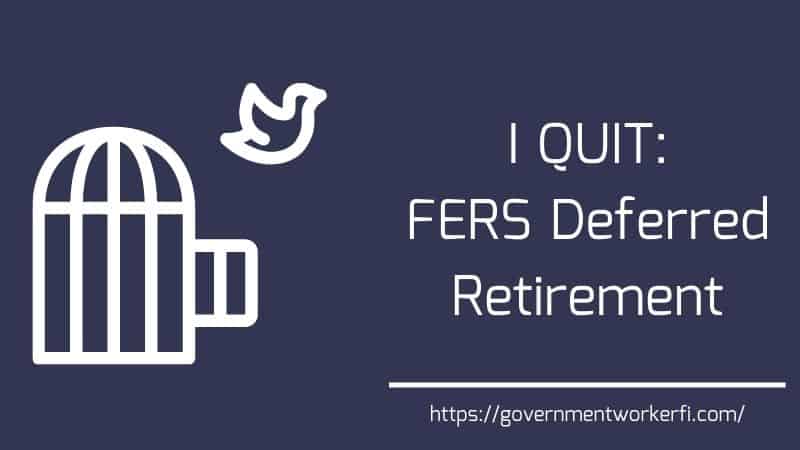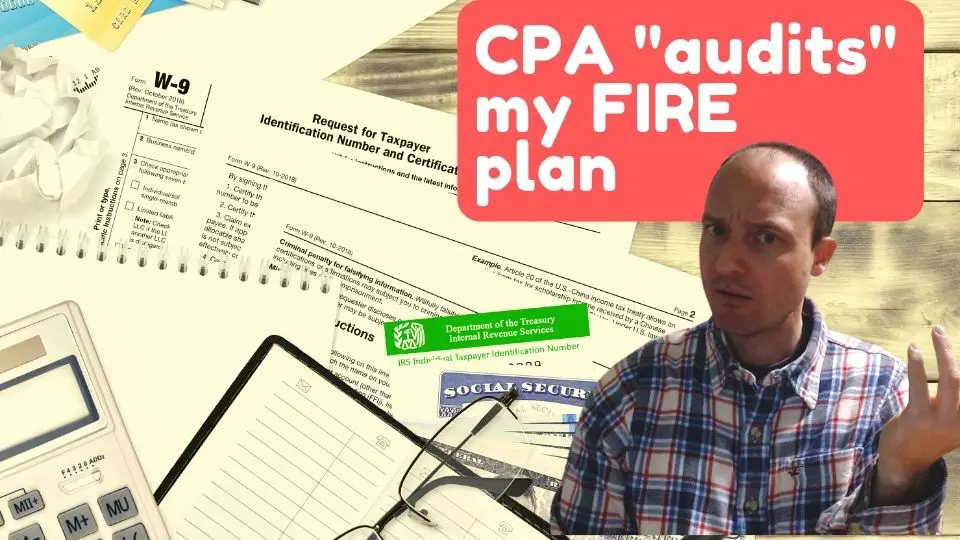Does your FERS minimum retirement age (MRA) seem too far away?
Are you thinking of retiring early?
Did you know that the federal government offers three different types of early retirement? Every day I see so much misinformation about early retirement from the federal government on social media.
If you’re going to retire early, you need to know whether you can keep your health insurance in retirement, how big your pension will be, and when you can collect it.
The good news is that I’ve spent a lot of time researching and summarizing these retirement options for you in this post. In addition, I’ve tried to include information about lots of alternatives to early retirement and even included a case study for you to consider.
Table of Contents
- What does “early retirement” mean in the federal government?
- The three types of early retirement in the federal government
- Why don’t more federal government employees take early retirement?
- Alternatives to early retirement from the federal government
- Summary- comparison of early retirement options for federal government employees
Note: This is a personal blog. Views presented here do not represent the views of the US Government. Please do not mistake my website for financial, legal, or human resources advice.
What does “early retirement” mean in the federal government?
I started my website as an “early retirement” or FIRE (Financial Independence/Retire Early) blog.
And when I think about my target reader, it is someone who is on top of their finances. They might want to explore early retirement but maybe they haven’t quite figured out how it impacts all of their benefits from the federal government.
But “early retirement” means something different to everyone. My blog friend Purple retired at age 30. Retiring at 40 is another popular milestone. However, for this blog article, I define early retirement as anything less than the FERS immediate retirement requirements.
To receive an immediate annuity, you need:
- Age 57 with 30 years of service
- Or Age 60 with 20 years of service
- Or Age 62 with 5 years of service
(You also have the option of retiring at age 57 with as little as 10 years of service, but I will address that later).
Get Gov Worker’s top 4 tips for federal employees!The three types of early retirement in the federal government
I think a lot of the confusion about early retirement in the federal government arises because there are three different types of early retirement: deferred retirement, postponed retirement, and VERA’s.
Honestly, I’m not surprised people confuse these options. To defer and to postpone are synonyms.
I often see people confuse the rules for deferred and postponed retirement. Honestly, I’m not surprised that people confuse these terms. To defer and to postpone are synonyms!
Because people frequently confuse the federal government early retirement language, I created an infographic to help people understand the differences.
![Had Enough? Federal Government Early Retirement [Ultimate How To Guide] 1 comparison of early retirement options for federal employees](https://cdn-0.governmentworkerfi.com/wp-content/uploads/2021/04/Comparison-of-Federal-Early-Retirement-Options-Graphic-682x1024.jpg)
Deferred Retirement
Deferred retirement is the most common of the three types of early retirement in the federal government. It is also the most important because it is available to any employee with 5 years of government service.
If you want a deep dive, I wrote an epic post about FERS deferred retirement.
However, here are the highlights:
- You do not get to keep your health insurance.
- You need at least 5 years of service to claim your pension at age 62.
- If you have 10 years of service, you can choose to claim your pension at age 62 or a reduced pension at age 57.
- If you have 20 years of service, you can choose to claim your full pension at age 60.
- You can calculate the size of your annuity from (1) your number of years of service (2) the average of your highest 3 years of salary.
- Annuity = 1% ✖ (Years) ✖ (Salary)
Still want more details? Here is what OPM says about deferred retirements.
Postponed Retirement
If you have reached your minimum retirement age but do not have 30 years of service, you can take a postponed retirement.
Note that if you are 57 years old, you can choose to either take a reduced annuity immediately, or choose to take a postponed retirement.
If you choose to retire at your MRA, you can begin receiving reduced annuity payments immediately and keep your health insurance in retirement.
On the other hand, if you’d like the full annuity amount, you can choose to postpone your retirement payments until age 62.
Choosing a postponed early retirement from the federal government comes with the following implications:
- You lose your FEHB upon separation. However, you can re-enroll in FEHB at age 62.
- You will no longer be eligible for Federal Employee Group Life Insurance (FEGLI).
- At age 62, you will receive an annuity based upon (1) your number of years of service (2) the average of your highest 3 years of salary.
- Annuity = 1% ✖ (Years) ✖ (Salary)
Personally, I don’t consider postponed retirement a true form of early retirement from the federal government because it is only open to people age 57 or older. However, I am amazed at how many people confuse deferred and postponed retirements on federal employee groups on Facebook and Reddit.
Postponed retirement is a nice way for people with 10 or more years of service to leave at age 57 and keep their full annuity payments. However, they will need to find alternate health insurance from the time they are 57 until they are 62.
Do you need more information about postponed retirement? You can read what OPM says about postponed retirements here.
Voluntary Early Retirement Authority (VERA)
Occasionally, the federal government will try to reduce its workforce through attrition. When they do this, they typically offer two different programs: “buy outs” (also called VSIPs or voluntary separation incentive payments) and “early outs” (also called Voluntary Early Retirement Authority or VERA).
A VSIP is a cash payment of up to $25,000 to quit. This does not affect other retirement benefits. So if you had 10 years of service, you would still be eligible for a normal deferred retirement. Typically, VSIPs are an incentive for people who can already retire to leave.
On the other hand, a VERA is an incentive the federal government offers employees to reduce the workforce through early retirement. It allows certain employees to retire before their MRA with full retirement benefits. To be eligible for a VERA you need
- 25 years of service OR
- 20 years of service and be 50 years old
Your workplace may not offer a VERA when you’re ready to retire.
Compared to deferred and postponed retirements, VERAs are much more generous.
- Employees who take a VERA can keep their FEHB.
- Annuity payments begin immediately upon separation.
- Annuity = 1% ✖ (Years) ✖ (Salary)
- Employees are eligible to receive a FERS supplement between the dates of their MRA and age 62 when they can receive social security benefits.
It is important to note however that you cannot plan to take a VERA. Your workplace may not offer a VERA when you’re ready to retire. Also, even if your workplace offered a VERA, they might not approve it for your position if you have a critical job.
Why don’t more federal government employees take early retirement?
Do federal employees really have golden handcuffs?
Kind of.
In one of my most shared posts, I describe how leaving the government just 1 day before your MRA will cost you over a million dollars in benefits.
And it’s not just monetary considerations. When I imagine myself retiring early, I give myself second-thoughts every time I consider these benefits of working for the federal government.
Vacation
Every year, I carry over 240 hours (6 weeks) of vacation each year. In addition, I earn another 5.2 weeks of new vacation each year. On top of that, I have 10 federal holidays per year.
In total, I have 7.2 weeks of paid time off per year (not including sick leave).
For those of you keeping score at home, that’s 14% of the year that I don’t have to work. (Here is a leave calendar to help you track all of the leave the government gives you).
I have 444 hours (55.5 days) of paid time off per year. And that doesn’t include sick time.
Fitness time
In addition to all of the vacation, I get 3 hours paid per week of “fitness time” to exercise. I take my health extremely seriously and exercise daily. Fitness time allows me to take a slightly longer lunch and workout in the middle of the day so that it does not interfere with family time.
Over the course of the year, 3 hours per pay week is 19.5 full working days.
If you add this to my vacation time, and annual leave, I have 444 hours (55.5 days) of paid time off per year.
As a result, even though I work “full time”, I am only working 1636 hours per year (or 79% of the typical 2080 hours the average American works).
Health Insurance
Contrary to popular belief, FEHB is not the best health insurance in the world. When Mrs. Gov worked in the private sector, we were on her very cheap, very generous health plan.
That being said, FEHB is much better and cheaper than health insurance you can get on the ACA exchanges.
Furthermore, if you make it to your MRA, you can carry your health insurance into retirement only paying the employee portion of the premiums.
This is an extremely rare (and valuable benefit).
Alternatives to early retirement from the federal government
I just spent the last section of this post describing all of the reasons I would be silly to retire early.
On the other hand, I am drawn to the siren song of being able to structure my own days. Being in complete control of my time to work on passion projects is a dream of mine.
In this section I try to describe some events that might cause me to reevaluate whether to say in my current federal job.
Doing nothing and staying in my current job until MRA.
- Likelihood of occurring: 7/10
- Desirably of outcome: 5/10
The easiest alternative to early retirement is to do nothing. make a good salary and enjoy a lot about my job. Additionally, I love my coworkers and feel very supported in my job. On the surface, there’s no reason to leave.
On the other hand, some parts of my job have been difficult. Before Covid, I traveled to much (1-2 times per month). Work travel is super stressful on my young family. It’s up to my wife to single-handedly get everyone where they need to go in the mornings, afternoons, and evenings.
And while supervising employees can be super rewarding, it can also be miserable.
On my best days at work, I believe I have the best job in the world. On my worst days, I wish I were already retired.
Congress guts federal retirement benefits
- Likelihood of occurring: 3/10
- Desirably of outcome: 1/10
If you’ve gotten to this point in the post you understand why I don’t want to retire early.
But what if Congress gutted federal retirement benefits?
The biggest reason to stay in a federal job after reaching financial independence is to keep FEHB for life. If Congress gets rid of that benefit, there is little reason to stay in a federal job.
Over my nearly 20 years of federal service, Congress has often debated changes to the FERS retirement system. There are almost always proposals to change the annuity formula or get rid of the FERS supplement.
If the FEHB or FERS supplement were eliminated, so would the incentive to stay until MRA.
I am not aware of proposed changes to FEHB. However, if Congress cut FEHB, it would be bittersweet. On one hand, I’d no longer have golden handcuffs keeping me tied to my desk. On the other hand, I’d lose a major benefit.
In other words, if the FEHB or FERS supplement were eliminated, there would be no incentive to stay until MRA.
Congress passes a single payer health care system
- Likelihood of occurring: 1/10
- Desirably of outcome: 9/10
This is almost the opposite of the last scenario. What if everyone had access to affordable health insurance regardless of employment? Can you imagine how many more people would not be afraid to make the leap and retire early?
If we all had access to affordable health insurance, then the FEHB benefit would not be unique. In that case, I would not hesitate to take an early retirement from the federal government when I have reached my financial independence milestone.
Moving to a low stress/part time federal job
- Likelihood of occurring: 3/10
- Desirably of outcome: 5/10
Let’s say that I don’t need money any more but I still need health insurance.
In that case, I could search for a new federal job that could meet my lifestyle goals. Ideally it would be a part time job.
I honestly don’t think this is a realistic outcome. I’m not sure such a job would exist. Secondly, what if I started somewhere new and it was a toxic work culture. I think I’d rather take the job I know rather than shoot for a unicorn job that could be a disaster.
(Although I could easily see being a part time receptionist at my current workplace.)
Negotiating my current job duties
- Likelihood of occurring: 5/10
- Desirably of outcome: 10/10
Instead of chasing a unicorn job, what if I tried to make a unicorn job. As I have said before, I like my job. I’m just not crazy about the following things:
- Supervisory duties (including endless trainings and extra meetings)
- Extensive travel (I wouldn’t mind traveling less than 6 times a year)
- Full time work. (I like my job but want more time to do the things I love)
In my mind, working part time in my current job is everything I want (and more).
If I were able to achieve these changes, I’d get to keep FEHB and all of the parts of my job I love– especially the awesome workplace culture we have. Furthermore, I’d moderate some of the unpleasant aspects of my job and add more time to work on passion projects.
In my mind, this is everything I want (and more).
Now- the big questions is whether I can pull it off. I think if I were confident in having enough “FU” money, (affiliate link) I could ask for this knowing I could walk away if it didn’t work the way I want it to.
However, even at >80% of the way to full financial independence, I’ve thought about asking to work part time and chickened out. I’m not sure I’ll ever have the confidence to do this.
Summary- comparison of early retirement options for federal government employees
In summary, a deferred retirement is available to anyone who has at least 5 years of service. However, it offers the least generous pension benefit package.
On the other hand, postponed retirement does not fit the traditional “early retirement” moniker. However, it might be a good option if you are older than the minimum retirement age.
VERA is by far the best deal for an early retirement as a federal employee. However, VERAs may or may not be offered when you’re ready for early retirement.
In addition to understanding these three different systems, it is important to also examine what you’d be giving up with early retirement. The FERS supplement, FEHB, and thrift savings plan (TSP) match are an amazing deal. So before jumping in to early retirement, you should make sure you are ready to take the leap.



